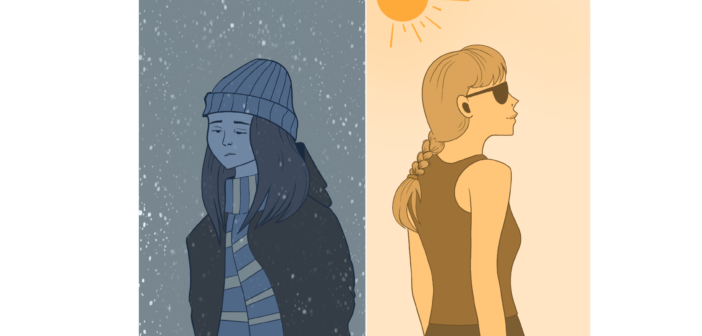As the seasons change, the state of some students’ mental health changes as well. As December comes closer and the hours of daylight grow shorter, students with seasonal affective disorder begin to face an entirely new set of difficulties. Here’s what you need to know about SAD and its impact on college students.
What Is seasonal affective disorder?
The National Institute of Mental Health explains that unlike short-term sadness, SAD is categorized by more significant mood changes. SAD is a type of depression connected to seasonal patterns, with symptoms that can last around 4-5 months.
SAD connects to the changes in how many hours of daylight we experience. Research suggests that when humans experience less sunlight, the molecules that help our bodies maintain normal serotonin levels stop functioning properly. People with SAD have also been found to have lower levels of serotonin, a chemical that helps regulate mood. As a result. people with SAD can experience different symptoms that are associated with depression, as well as disorder-specific symptoms. SAD typically begins in young-adulthood.
There are two different SAD patterns, winter-pattern SAD (symptoms start in late fall/early winter) and summer-pattern SAD (symptoms occur during spring and summer). With winter quickly approaching, this article will focus on winter-pattern SAD.
Signs And symptoms of SAD
Mayo Clinic shared a list of signs and symptoms for individuals to recognize SAD. These signs and symptoms include sleeping too much, feeling hopeless or having thoughts of not wanting to live, feeling sad nearly every day, lowered energy, overeating, difficulty concentrating and a loss of interest in things you enjoyed before. A few symptoms that are specific to fall/winter SAD include oversleeping, changes in appetite and weight and feeling tired.
Have you recently noticed you or your roommate are skipping morning classes more than normal? Have you recently felt low in energy or felt a sadness that lasts most of your day? Has concentrating on school work been more difficult lately? As the hours of daylight we experience begin to decrease, some of these symptoms may begin to show themselves in college students.
The Impact on college students
Penn State explains the connection between SAD and college freshman. New students often experience big life change around this time, such as moving states and new college workloads. These can both contribute to developing SAD. As the fall semester begins, and the hours of daylight shorten, getting up for classes and maintaining motivation can become difficult.
How to treat SAD
Cornell College shares several ways to treat or lessen the effects of SAD. Some include light therapy, exercise, sleeping 7-9 hours a night, keeping a balanced diet and therapy. Here are a few ideas of how you can incorporate some of these treatments into your time at NCC.
Students may consider taking walks around campus or visiting some of the athletic facilities. The Residence Hall/Recreation Center is home to athletic courts, a fitness center and a walking track. If you are looking for a way to incorporate exercise into your routine, visiting this facility is a good place to start.
Try to stick to a schedule. Getting enough sleep is important, especially for college students. Try to get around 7-9 hours of sleep each night but avoid sleeping too much. It may be helpful to wake up at the same time every morning to get yourself into a routine.
The CDC provides some healthy eating tips to help you find ways to maintain a balanced diet when eating on campus.
If you’re looking for help with SAD, the Dyson Wellness Center is a good first stop to find the right treatment for you. They offer short-term counseling services, referrals to resources off-campus and 24-hour healthcare for students.
Call 630-637-5550 to schedule an appointment.
Resources For mental health services:
For an emergency call 911.
For emotional support for those in a suicidal crisis or emotional distress, call or text 988 for the Suicide and Crisis Lifeline.
The Dyson Wellness Center, located on the 2nd floor of the Benedetti-Wehrli Stadium, offers short-term counseling services, and referrals to off-campus resources.
NCC’s list of resources
The SAMHSA National Helpline offers free confidential treatment referral and information service for anyone facing mental and/or substance use disorders. Call 1-800-662-HELP (4357). For treatment referrals via text message, text 435748 (HELP4U).
Click here for more Naperville Mental Health Resources.

